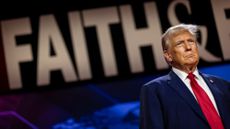What message is Trump sending with his Cabinet picks?
By nominating high-profile loyalists like Matt Gaetz and RFK Jr., is Trump serious about creating a functioning Cabinet, or does he have a different plan in mind?


Donald Trump has wasted little time in the weeks following his electoral victory over Vice President Kamala Harris, rolling out his picks for key administration positions in rapid-fire succession. His choices range from consummate Beltway insiders to high-profile campaign surrogates who have been tapped for positions seemingly beyond their qualifications. The latter trend has alarmed many observers from both sides of the aisle, particularly regarding sensitive posts at the top of the Pentagon and Justice Department, for which Trump has nominated Fox News host Pete Hegseth and former Florida Rep. Matt Gaetz, respectively.
That Hegseth retired from the military without policy or senior leadership experience, or that Gaetz was recently investigated for sex trafficking by the very department he's been tapped to lead seems not to bother Trump, who last week named vaccine conspiracy theorist Robert F. Kennedy Jr as his choice to run the Department of Health and Human Services. Instead, this slate of attention-grabbing nominees has raised questions not only about their potentially dubious eligibility but whether the president-elect is sending a message with his choices. Does Trump truly believe these are the best people to lead some of the most powerful political institutions on Earth, or are their nominations in service of a different goal?
What did the commentators say?
Trump's nominees are his "first show of force to Senate Republicans," said The New York Times, serving in part as a "denial-of-service attack against one of the checks on the presidency." The slate of nominees "seem designed to poke the Senate in the eye," Brennan Center for Justice President Michael Waldman said to the paper.
Subscribe to The Week
Escape your echo chamber. Get the facts behind the news, plus analysis from multiple perspectives.

Sign up for The Week's Free Newsletters
From our morning news briefing to a weekly Good News Newsletter, get the best of The Week delivered directly to your inbox.
From our morning news briefing to a weekly Good News Newsletter, get the best of The Week delivered directly to your inbox.
In particular, the choice of Gaetz, who resigned from Congress this month just days before a House Ethics Committee report on his alleged sex crimes and drug use was set to be released, is about "more than just running afoul of norms," Time said. Instead, it is a "signal to take Trump's most offensive, anti-democratic claims over the last year deadly seriously." Despite his reputation for "defying tradition and going against the grain," Trump's slate of nominees "suggest a larger agenda," the Los Angeles Times said. Given the "difference between having a broader ideological mix" and choosing an accused "sex trafficker for attorney general of the United States" former Trump administration official Marc Short said to the paper, "I think he’s trying to disrupt." But it's possible it isn't "clearly thought through."
Trump's extreme-seeming picks may also be part of a larger tactic to wear down congressional resistance ahead of a second slate of more preferable nominees. "Gaetz for AG, 'false flag' op? Making whoever Trump picks next (after Gaetz inevitably pulls out) seem like a normie by comparison?" said NBC's Chuck Todd on X. "Trump is surely floating Gaetz, so that when he names his real AG, Dems (and Rs) will be so relieved, they'll support a ferocious right-winger they otherwise would have opposed merely for being qualified," arch-conservative commentator Ann Coulter said X.
While it's possible that Trump genuinely wants Gaetz as his "top dog" at the Justice Department, it's similarly likely that Trump is "intentionally making the Florida firebrand his fall guy," The Washington Examiner said. By setting Gaetz up to fail, Trump is giving the "centrist wing of the party cover when political opponents try to accuse them of rubber-stamping all of Trump's appointments."
What next?
While Congress is in the "habit" of giving presidents "latitude in choosing their own teams," NBC News' Peter Nicholas said, Trump's unorthodox choices mean a "fight might be in the offing" between him and his own party on Capitol Hill. But Trump's "bitter experience" from his first term in office shows that he "needs an attorney general he can trust implicitly, and it might be worth the political capital to battle for Gaetz's confirmation."
Trump has also pushed for the GOP's congressional majority to step back and allow him to leapfrog their nomination process through recess appointments — something Senate Republicans, wary of their own power base as a co-equal branch of government, are reluctant to do. To that end, Trump has "threatened to use a Constitutional power that no president has used before to adjourn Congress to fill his Cabinet positions," said USA Today.
"I hope President-elect Trump comes to the conclusion that if a person, no matter how loyal, cannot reasonably hope to be confirmed by a Senate in firm Republican control, then that person should not be a nominee," said The National Review's Andrew McCarthy. "This isn't hard."
Sign up for Today's Best Articles in your inbox
A free daily email with the biggest news stories of the day – and the best features from TheWeek.com
Rafi Schwartz has worked as a politics writer at The Week since 2022, where he covers elections, Congress and the White House. He was previously a contributing writer with Mic focusing largely on politics, a senior writer with Splinter News, a staff writer for Fusion's news lab, and the managing editor of Heeb Magazine, a Jewish life and culture publication. Rafi's work has appeared in Rolling Stone, GOOD and The Forward, among others.
-
 The far-right conspiracy conduit who will be Trump's information gatekeeper
The far-right conspiracy conduit who will be Trump's information gatekeeperIn the Spotlight How Natalie Harp rose from obscurity to trusted Trump aide
By David Faris Published
-
 Trump talks pardoning Jan. 6 rioters, jailing rivals
Trump talks pardoning Jan. 6 rioters, jailing rivalsSpeed Read On NBC's "Meet the Press," the president-elect said he would pardon Capitol rioters and end constitutionally guaranteed "birthright" citizenship
By Peter Weber, The Week US Published
-
 How will the rebels rule Syria?
How will the rebels rule Syria?Today's Big Question Fall of Assad regime is a 'historic opportunity' and a 'moment of huge peril' for country and region
By Elliott Goat, The Week UK Published
-
 What Donald Trump owes the Christian Right
What Donald Trump owes the Christian RightThe Explainer Conservative Christians played an important role in Trump’s re-election, and he has promised them great political influence
By The Week UK Published
-
 Could Trump use impoundment to skate around Congress?
Could Trump use impoundment to skate around Congress?Today's Big Question The incoming president could refuse to spend money allocated by the legislative branch
By Justin Klawans, The Week US Published
-
 Labour's plan for change: is Keir Starmer pulling a Rishi Sunak?
Labour's plan for change: is Keir Starmer pulling a Rishi Sunak?Today's Big Question New 'Plan for Change' calls to mind former PM's much maligned 'five priorities'
By Sorcha Bradley, The Week UK Published
-
 'At what point does hyper-personalization become incredibly impersonal and detached?'
'At what point does hyper-personalization become incredibly impersonal and detached?'Instant Opinion Opinion, comment and editorials of the day
By Justin Klawans, The Week US Published
-
 Who will win the coming US-China trade war?
Who will win the coming US-China trade war?Talking Points Trump's election makes a tariff battle likely
By Joel Mathis, The Week US Published


